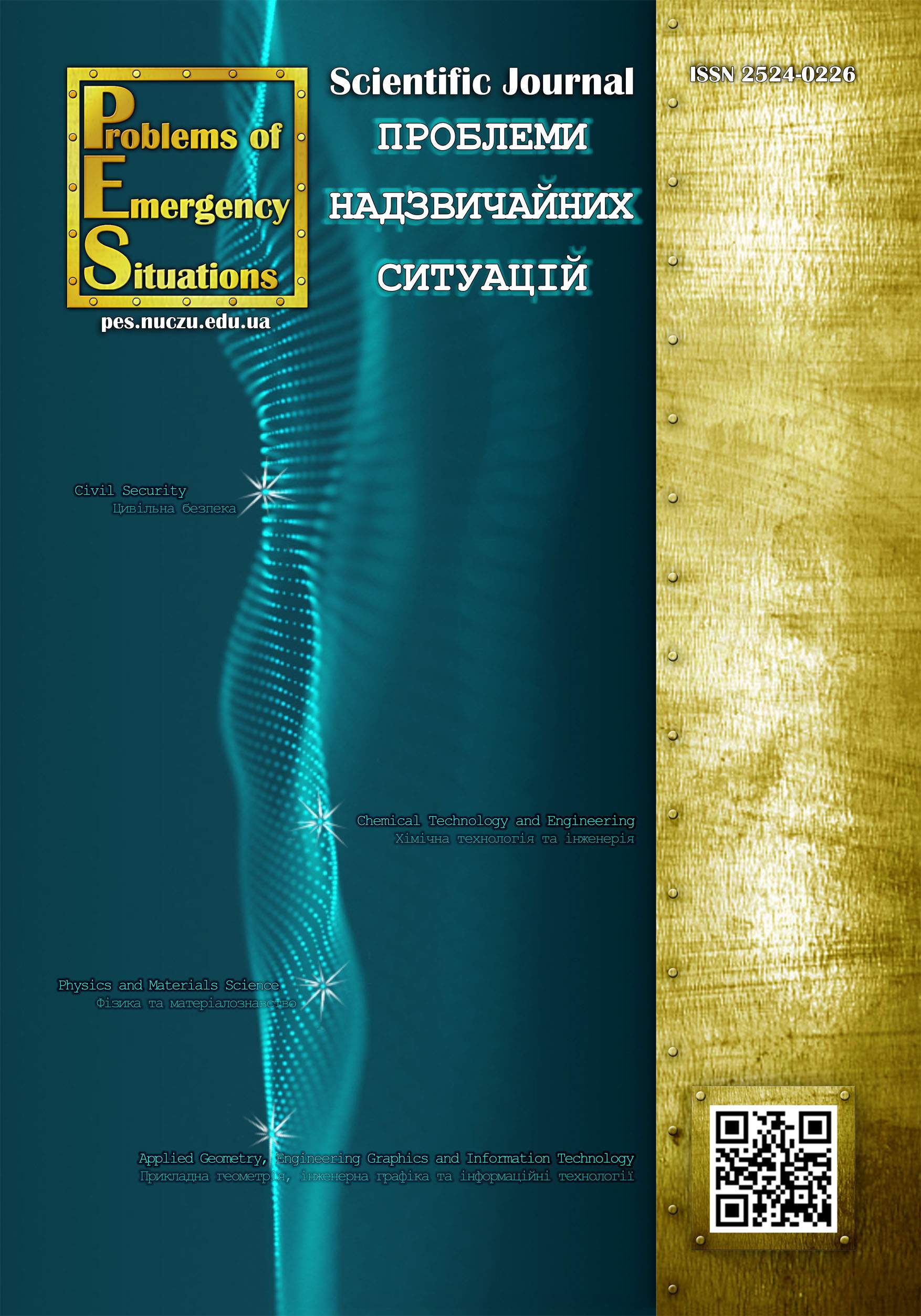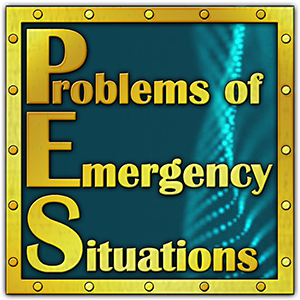Fire extinguishing efficiency of lightweight bulk materials when extinguishing acetone.
Kireev Oleksandr
National University of Civil Protection of Ukraine
https://orcid.org/0000-0002-8819-3999
Hapon Yuliana
National University of Civil Protection of Ukraine
http://orcid.org/0000-0002-3304-5657
Chyrkina-Kharlamova Maryna
National University of Civil Protection of Ukraine
https://orcid.org/0000-0002-2060-9142
Nuianzin Vitalii
National University of Civil Protection of Ukraine
http://orcid.org/0000-0003-4785-0814
Maiboroda Artem
National University of Civil Protection of Ukraine
https://orcid.org/0000-0001-6108-9772
DOI: https://doi.org/10.52363/2524-0226-2025-41-7
Keywords: acetone, vermiculite, fire extinguishing ability, crushed foam glass, perlite, swollen bulk materials
Аnnotation
Experimental studies of the fire extinguishing ability of systems based on bulk porous materials during acetone extinguishing were carried out. For this purpose, the experimental methodology for determining the fire extinguishing properties of such extinguishing agents, which was previously proposed for ethanol, was chosen. Crushed foam glass, granulated swollen perlite, and vermiculite were selected as bulk materials. As the bottom layer, which ensures the buoyancy of the fire extinguishing system, granular foam glass with a granule size of 10-15 mm was used. As the upper layer, which provides high insulating properties, we consider swollen perlite with a size of spherical granules with a diameter of 1-1.5 mm and swollen lamellar vermiculite with a linear size of 1×2 mm. The buoyancy of the selected bulk materials in acetone, their bulk density and moisture retention were experimentally determined. On the basis of the experimental results, the heights of the layers of dry and wetted bulk materials required for acetone extinguishing were calculated. It was found that the wetting of bulk materials leads to a significant increase in their extinguishing properties. This fact is explained by two factors: an increase in the insulating properties of perlite and vermiculite due to filling the voids between the perlite and vermiculite granules and a decrease in the concentration of acetone vapour due to its absorption by water. The introduction of water also increases the cooling properties of the fire extinguishing system. The lowest heights of fire extinguishing layers during acetone extinguishing are provided by the systems: wetted foam glass – 6.5 cm and foam glass (5.5 cm)+perlite (1 cm)+water. An expert evaluation of the complex parameter of the effectiveness of fire extinguishing agents for the selected fire extinguishing systems when extinguishing acetone was carried out. The best result was shown by wetted foam glass Further directions of research on the fire extinguishing characteristics of systems based on bulk porous materials and methods for establishing a complex parameter of the effectiveness of fire extinguishing agents are outlined.
References
- EN 1568-1:2018. Fire extinguishing media – Foam concentrates – Part 1: Specification for medium expansion foam concentrates for surface application to water-immiscible liquids. European committee for standardization, 44 . URL: https://standards.i
ai/catalog/standards/cen/29188adf-ed7b-49cf-9e76-b996ab64fd89/en-1568-1-2018 - EN 1568-2:2018. Fire extinguishing media – Foam concentrates – Part 2: Specification for high expansion foam concentrates for surface application to water-immiscible liquids. European committee for standardization, 41. Available at: https://standards.iteh.ai/catalog/standards/cen/1b7c7790-8464-4bc4-9ec6-b98ac41ff5ed/en-1568-2-2018
- EN 1568-3:2018. Fire extinguishing media – Foam concentrates – Part 3: Specification for low expansion foam concentrates for surface application to water-immiscible. European committee for standardization, 59. Available at: https://standards
.iteh.ai/catalog/standards/cen/6e79e77f-10b9-4be3-b589-23797d03ae3b/en-1568-3-2018 - Borovykov, V. O., Chepovskyi, V. O., Slutska, O. M. (2009). Rekomendatsii shchodo hasinnia pozhezh u spyrtoskhovyshchakh, shcho mistiat etylovyi spyrt. MNS Ukrainy. K.:UkrNDIPB, 76.
- Ivanković, T. (2010). Surfactants in the environment.Arh. Hig. Rad. Toksikol, 61, 1, 95–110. doi: 2478/10004-1254-61-2010-1943
- Olkowska, E. (2011). Analytics of surfactants in the environment: problems and challenges. Chem. Rev, 111, 9, 5667–5700. doi: 1021/cr100107g
- Dadashov, I., Loboichenko, V., Kireev, A. (2018). Analysis of the ecological characteristics of environment friendly fire fighting chemicals used in extinguishing oil products. Pollution Research, 37, 1, 63–77. Available at: http://29yjmo6.
cz/bitstream/123456789/9380/1/Poll%20Res-10_proof.pdf - Trehubov, D. H., Dadashov, I. F., Minska, N. V., Hapon, Yu. K., Chyrkina-Kharlamova, M. A. (2023). Fizyko-khimichni osnovy rozvytku ta hasinnia pozhezh horiuchykh ridyn: navch. posib. Kh.: NUTsZU, 229. Available at: http://repositsc.nuczu.edu.ua/bitstream/123456789/19111/3/ФХОПРпрепрінт.pdf
- Dubinin D., Korytchenko K., Lisnyak A., Hrytsyna I., Trigub V. (2017). Numerical simulation of the creation of a fire fighting barrier using an explosion of a combustible charge. Eastern-European Journal of Enterprise Technologies, 6(10(90)), 11–16. doi: 10.15587/1729-4061.2017.114504
- Semko, A., Beskrovnaya M., Vinogradov S., Hritsina I., Yagudina N. (2017). The usage of high speed impulse liquid jets for putting out gas blowouts. Journalof Theoretical and Applied Mechanics (Poland), 3, 655–664. Available at: https://www.
com/inward/record.uri?eid=2-s2.0-84938701022&partnerID=40&md5=
7bb1aef5a447873de21f8e81c67eedd0 - Dubinin, D., Korytchenko K., Lisnyak A., Hrytsyna I., Trigub V. (2018). Improving the installation for fire extinguishing with finely dispersed water Eastern European Journal of Enterprise Technologies, 2, 10–92, 38–43. doi: 10.15587/1729-4061.2018.127865
- Vambol, S., Bogdanov, I., Vambol, V., Suchikova, Y., Kondratenko, O., Hurenko, O., Onishchenko, S. (2017). Research into regularities of pore formation on the surface of semiconductors. Eastern-European Journal of Enterprise Technologies, 3, 5–87, 37–44. doi: 10.15587/1729-4061.2017.104039
- Chernukha, A., Teslenko, A., Kovalov, P., Bezuglov, O. (2020). Mathematical Modeling of Fire-Proof Efficiency of Coatings Based on Silicate Composition. Materials Science Forum, 1006, 70–75. doi: 4028/www.scientific.net/msf.1006.70
- Vasilchenko, A., Otrosh, Y., Adamenko, N., Doronin, E., Kovalov, A. (2018). Feature of fire resistance calculation of steel structures with intumescent coating. MATEC Web of Conferences, 230, 02036. doi: 10.1051/matecconf/201823002036
- Kustov, M., Kalugin, V., Tutunik, V., Tarakhno, O. (2019). Physicochemical principles of the technology of modified pyrotechnic compositions to reduce the chemical pollution of the atmosphere. Voprosy Khimii i Khimicheskoi Tekhnologii, 1, 92–99. doi:32434/0321-4095-2019-122-1-92-99
- Dadashov, I. F., Kirieiev, O. O., Trehubov, D. H., Tarakhno, O. V. (2021). Hasinnia horiuchykh ridyn tverdymy porystymy materialamy ta heleutvoriuiuchymy systemamy. Kharkiv, 240. Available at: http://repositsc.nuczu.edu.ua/
handle/123456789/14033 - Makarenko, V. S., Kirieiev, O. O., Trehubov, D. H., Chyrkina, M. A. (2021). Doslidzhennia vohnehasnykh vlastyvostei binarnykh shariv lehkykh porystykh materialiv. Problemy nadzvychainykh sytuatsii, 1(33), 235–245. doi: 10.52363/2524-0226-2021-33-18
- Wang, Hao, Chen, Ziwei, Ji, Ru, Liu, Lili, Wang, Xidong. (2018). Integrated utilization of high alumina fly ash for synthesis of foam glass ceramic. Ceramics International, 44(12). 13681–13688. doi: 1016/j.ceramint. 2018.04.207. S2CID 139498288
- S. Geological Survey. (2022). Mineral commodity summaries 2022: U.S. Geological Survey, 202 . doi: 10.3133/mcs2022
- Makarenko, V., Kireev, А., Slepuzhnikov, Y., Hovalenkov, S. (2023). Properties of multi-component fire extinguishing systems based on light bulk materials. Key Engineering Materials, 954, 177–184. doi: 10.4028/p-6v6dmx
- Kirieiev, O., Hapon, Yu., Chyrkina-Kharlamova, M., Slepuzhnikov, Ye., Cherkashyn, O. (2024). Vybir naibilsh efektyvnoho zasobu hasinnia lehkozaimystykh ridyn. Problemy nadzvychainykh sytuatsii, 2(40), 30–43. doi: 10.52363/2524-0226-2024-40-3
- Babashov, I., Dadashov, I., Kirieiev, O., Savchenko, O., Musaiev, M. (2023). Rezultaty vyznachennia vohnehasnykh kharakterystyk lehkykh sypkykh materialiv pry hasinni etanolu. Problemy nadzvychainykh sytuatsii, 1(37), 250–263. Available at: http://repositsc.nuczu.edu.ua/bitstream/123456789/17964/1/18.pdf
- Mahammad, E., Musayev, Ilgar F. Dadashov, Alexander A. Kireev, Rza Kh. Khudiyev. (2024). Research fire extinguishing and insulating characteristics of fast-hardening foams. Processes of Petrochemistry and Oil Refining, 25, 2, 567–577. doi: 62972/1726-4685.2024.2567














